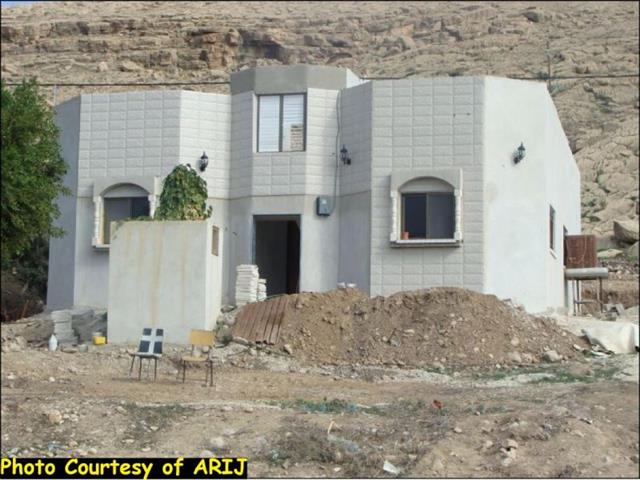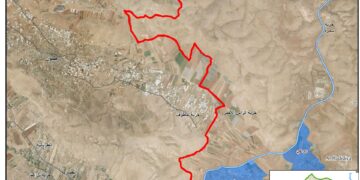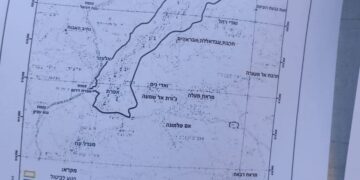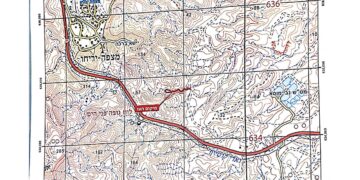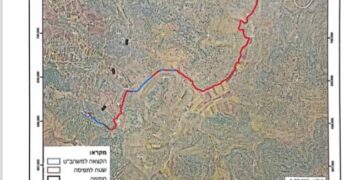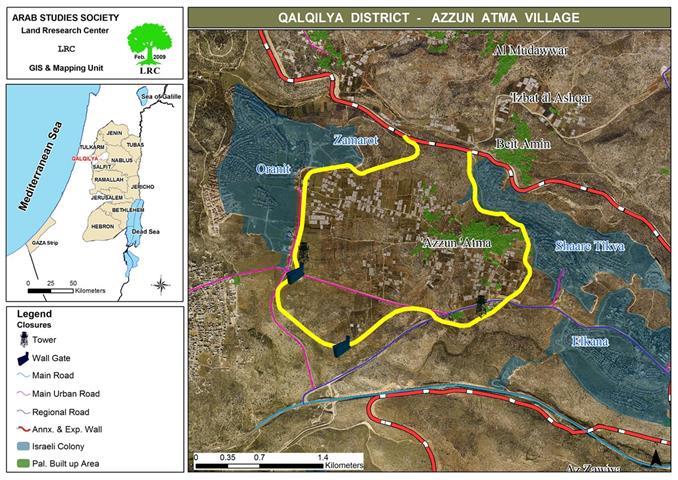
Map 1: the location of some of the threatened structures in Al JIftlik Village
Israel, during the past few years, has advocated such kind of demolition and displacement against resident of Al Jiftlek village. In November 2010, and under
the pretext of lacking valid building license, the Israeli Occupation bulldozers raided Abu Al A’jaj Area in Al Jiftlek village and demolished three structures, one residential Structure owned by Adnan Muhammad D’eis, one sheep barn owned by Issa ‘Adnan D’eis and another sheep barn owned by Shihda Mohammad D’eis. This incident has led to the displacement of of 16 family members and 20 sheep.
Map 2: the Demolished Structures in Abu Al-‘Ajaj area in Al Jiftlik village
A glance about Al Jiftlek village:-
The village of Al Jiftlik lies in the northern part of Jericho Governorate, and in the Middle of the Jordan Valley area. It has a population of 5,535 (PCBS 2009) and sets on a total land area of 81283 dunums, of which, 194 dunums are classified as the built-up area. The village is surrounded by a number of Israeli settlements and military bases; from the northeast, lie the settlement of Argaman and the Palestinian villages of Marj Na’ja, Az Zubeidat and Marj Al Ghazal; from the southwest, the village is bordered by a number of Israeli military bases and the settlement of Massu’. From the west it is bordered by Jaffa An Nun village and Israeli bypass roads 90 & 57 from the east.
The Village was known as the heart of the food basket of Palestine. Yet, and due to the policies imposed on it by the Israeli Occupation Authorities (IOA), this village is no longer known so, but rather it falls under the threat of desertification and displacement at the hands of the Israeli Occupation Authorities (IOA) and Settlers living in the nearby settlements such as Massu’ and Argaman. The IOA has directed the flow of water wells and springs for the use of Israeli settlements located nearby. Furthermore, due to the nature of the village, residents of the village relay on cattle raising and farming for living, but the continuous Israeli measures prevent Palestinian villagers from earning income sufficient to continue living in the area. The village is also in need for basic services such as water networks, electricity networks, and educational and medical services. Electricity is only provided for one quarter of the population in the village; water supply system in the village is only activated when the Israeli Occupation Authorities and Massu’ Settlement local council permit so; In addition, the village lacks Sewage networks. The educational complex is in a premature phase due to the lack of building materials and here students get their education in Tents and structures are made out of mud. As for Medical services, the only Medical center that is in the village is humble and lacks medical supplies and logistics.
Following the Israeli Occupation of the West Bank including East Jerusalem and the Gaza strip, the Israeli Occupation Authorities adopted a ‘Plan’ which aimed at displacing Palestinian inhabitants from their communities in the eastern part of the West Bank area. The IOA first declared large areas of the lands as ‘closed military areas’ and prohibited Palestinian construction and development, while at the same time, allowed for the establishment of Israeli settlements and military bases and construction of bypass roads to make it easy for settlers to travel between settlements. Al Jiftlek Village was among the Palestinian villages which were affected by the Israeli procedure which aimed at displacing Palestinians from their place of their residency to make room for colonial plans to be implemented in the area.
To conclude:-
Al Jiftlik Village is one of the most stunning examples of how the Israeli Occupation Authorities violate International Law Conventions, and contradicts its own claims about achieving Peace with the Palestinians. The village, despite all the limitations imposed on it and suffocate its sustainability, yet it tries to make use of the existing resources such as cattle raising and farming, but even though, during the Vegetables harvest season, the Israeli Occupation Authorities and in cooperation of of Israeli settlers, prohibit villagers from selling their agricultural products due to the military checkpoints that are set at village’s entrances to prohibit farmers from leaving the village with their products to sell them. Due to this procedure, products decay and financial losses are encountered.
According to Article 53 of the Fourth Geneva Convention, ‘Any destruction by the Occupying Power of real or personal property belonging individually or collectively to private persons, or to the State, or to other public authorities, or to social or cooperative organizations, is prohibited, except where such destruction is rendered absolutely necessary by military operations’. In addition, in the year 2004, the United Nations Security Council called on Israel ‘to stop demolition of Palestinian homes under Resolution No. 1544-(2004) and ‘respect its obligations under international humanitarian law, particularly the obligation not to undertake home demolitions contrary to that law’.


